The Jesuit Border Podcast: A Q&A with Fr. Brian Strassburger, S.J.
BY ISN STAFF | December 16, 2021
Editor’s Note: Fr. Brian Strassburger, S.J., and Fr. Louie Hotop, S.J., are two recently ordained Jesuit priests, who, for their first mission, have been sent to the Catholic Diocese of Brownsville, in Texas to work in the Rio Grande Valley along the U.S.-Mexico border. Both Fr. Brian and Fr. Louie are new to work on the border, and they are the first two Jesuits missioned to Brownsville.
Part of their work is the newly launched Jesuit Border Podcast. Each weekly episode highlights stories from their ministry on the border and an interview with someone particularly involved in the Catholic response to the on-the-ground reality.
ISN spoke with Fr. Brian recently about their ministry and the podcast. You can find the Jesuit Border Podcast wherever you get your podcasts, plus you can subscribe to the podcast newsletter here.
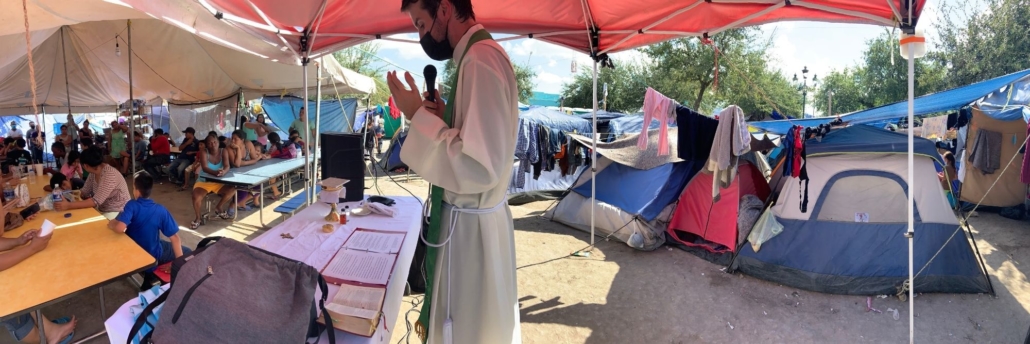
ISN: Thanks so much for talking with us! Can you tell us a little bit about yourself and Louie?
Fr. Brian: Louie is from St. Louis, MO, and entered the Jesuits at 18 years old, after graduating from Saint Louis University High School. I grew up in Denver, CO, where I first met the Jesuits at Regis Jesuit High School. Then I attended Saint Louis University, and I was five years out of college when I joined the Jesuits. We were both ordained priests in June 2021, and our first mission as Jesuit priests is to serve in the Diocese of Brownsville, TX.
ISN: How did this new mission in the Diocese of Brownsville come to be?
Fr. Brian: In October 2020, our Jesuit provincial, Fr. Tom Greene, S.J., was visiting Brownsville. He took a trip into a migrant camp in Matamoros, Mexico with Sr. Norma Pimentel, M.J., and he was struck by the tremendous needs. As Jesuits, we talk about going to the margins and working with the most vulnerable. Why were we not working in the Rio Grande Valley? It is one of the poorest counties in the country. And the migrant needs are tremendous on both sides of the border. Fr. Greene called up Louie and me to see if we would be interested in coming here for our first mission after our ordination. We couldn’t have said yes any faster!
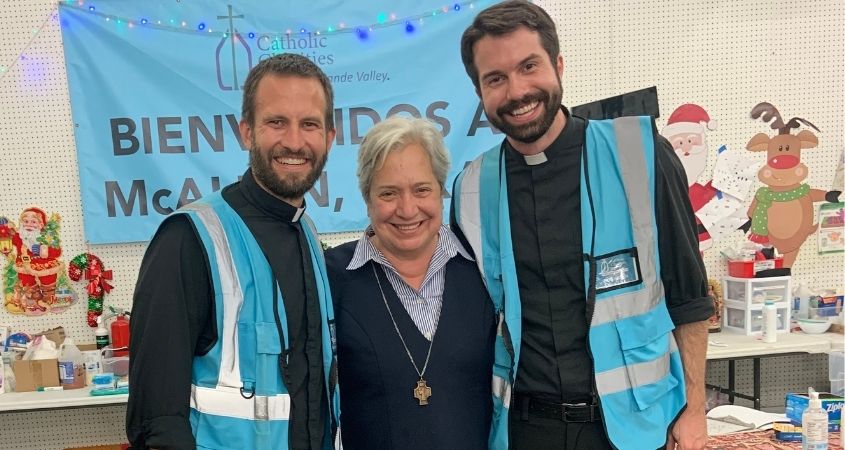
Fr. Brian Strassburger, Sr. Norma Pimentel, and Fr. Louie Hotop.
ISN: What about you and Louie made you well suited as the first Jesuits in this mission?
Fr. Brian: I had spent 2.5 years working in Nicaragua as part of my formation, and I had a lot of interest in migration and working on the border. This mission felt like the perfect fit. Louie had spent most of his adult life learning Russian and preparing to go there as a priest. So, it was quite a shift for Louie, but he was so sold on the mission that he didn’t hesitate to say yes.
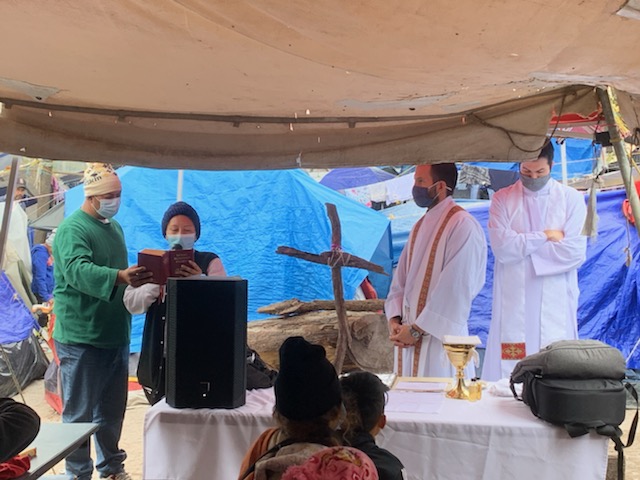
Frs. Brian and Louie celebrate mass in Reynosa, Mexico.
ISN: Tell us about your work in Brownsville and Reynosa.
Fr. Brian: Our weeks are all over the place. We are parochial vicars at a pair of parishes outside of Brownsville, where we help with sacramental ministry and other parish activities. On Tuesdays and Thursdays, we dedicate our time to helping the migrant population. Right now, that means we spend our mornings in Reynosa, Mexico, where the plaza is filled with 2,000-3,000 migrants who are stuck in limbo. They have fled situations of violence and poverty in their home countries of Central America, so they cannot return. And they are not permitted to enter the U.S. to seek asylum because of current U.S. policy. We bring basic supplies (hygiene products, warm clothing, tarps, etc.), and we celebrate Mass under a few of the tents. In the afternoons, we visit the Humanitarian Respite Center in McAllen, TX, where families with young children have been allowed into the U.S. to seek asylum. They pass through the HRC for a few hours or a couple of days as they arrange transportation to reunite with family and friends in the U.S. to await their immigration court date to make their asylum claim.
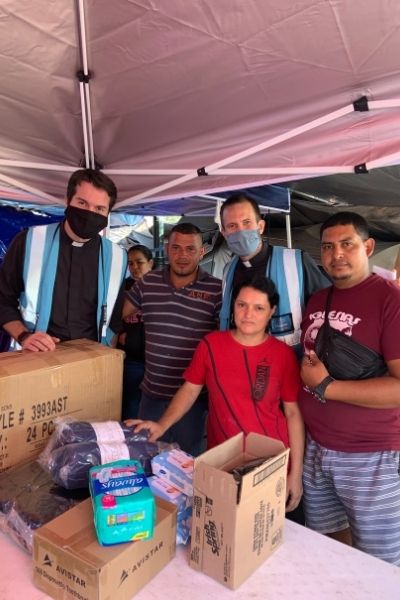
Frs. Louie and Brian deliver supplies to Reynosa, Mexico.
On Sunday afternoons, after we’ve presided at Masses at our parishes, we go to San Felipe, another parish in the diocese. One to two hundred migrant children get bused to the parish weekly from the local detention centers. They are unaccompanied minors who are under 18 and didn’t travel with a parent, so they are held in detention centers until they can be released to a family member in the U.S. The Dominican sisters and choir lead them in songs, then we celebrate Mass, and it ends with volunteers from the parish handing out food and drinks. It’s the only time during the week that the children can leave the centers.
Beyond all that, we have a podcast! The Jesuit Border Podcast highlights the Catholic response on the U.S.-Mexico border. Our first season is built around the themes of Catholic Social Teaching, with stories from our experiences and interviews with people working in the Rio Grande Valley.
ISN: Can you share a story from your time in Brownsville thus far that has impacted your own work and ministry as it evolves?
[NOTE: names changed for privacy]
Fr. Brian: Ernesto is a seven-year-old boy living in the camp in Reynosa with his mother. The first time I visited the camp, I sat next to him at a table as he was drawing in a coloring book. I spent just a few minutes with him. On my next visit a couple of days later, Ernesto ran up to me and gave me a big hug, completely unsolicited. He continues to do the same every time I visit. It’s one of my highlights of the day! And he always finds a space to sit and join for the Mass we celebrate. His mom even snapped a picture of him with us in the background during Mass one day. It breaks my heart knowing the challenging circumstances in which Ernesto finds himself, living in tents in a plaza in northern Mexico. But he also warms my heart every visit with his hug and his big smile.
Marta is a 25-year-old woman who was living in the plaza in Reynosa. She came from Honduras with her young daughter. Marta helped run one of the cocinas that distribute food and other donations to the other migrants in the plaza. She was always there to greet us when we arrived, and she loved to join for Mass. She recently had her daughter cross the border without her and turned into U.S. immigration. It was a dangerous choice, but it worked out: the girl was held in detention for a couple of weeks and then released to her father in New York City. But that leaves Marta separated from both her daughter and husband, and continuing to live in the camp. She’s debated making a dangerous crossing through the desert to enter the country undocumented to be able to be with her family. Recently, she was offered space in Senda de Vida, a more stable migrant shelter in Reynosa. It got her out of the plaza and discouraged her from making a dangerous and risky attempt to enter the U.S. But it also hasn’t gotten her any closer to her husband and daughter. Her wait continues.
ISN: Tell us about the podcast: what led to its creation?
Fr. Brian: The podcast was born because we were immediately struck by the situation down here. And we were quickly trying to get up to speed with what was going on. We realized how little we knew about the migrant reality. And if that’s the case for us, there has to be a lot of other people who feel the same way! Sure enough, plenty of family and friends expressed curiosity about our work.
Plus, there are so many stories to share. Migration is really about the people who have made difficult decisions to leave home and undertake a long and dangerous journey in search of something better for themselves and their families. We wanted to share some of those stories.
Beyond all that, we were so struck by the Catholic response on the border. Non-profit organizations in general are doing a lot of the heavy lifting for the humanitarian response, and many of them are Catholic. This is an aspect of the Church that doesn’t get highlighted enough. Our faith is not just about going to Mass on Sundays, our faith is about putting the Gospel into action. We see so much evidence of that down here, that we wanted to highlight it.
In particular, we’re trying to use the perspectives of our faith in what we’re talking about and who we are interviewing. The hope is that listeners will come away having learned something about immigration and the amazing work taking place down here. But more than that, it’s about touching hearts. It’s easy for the issue of immigration to get wrapped up in statistics and stereotypes. We want to share the stories of actual migrants and the people who are accompanying them.
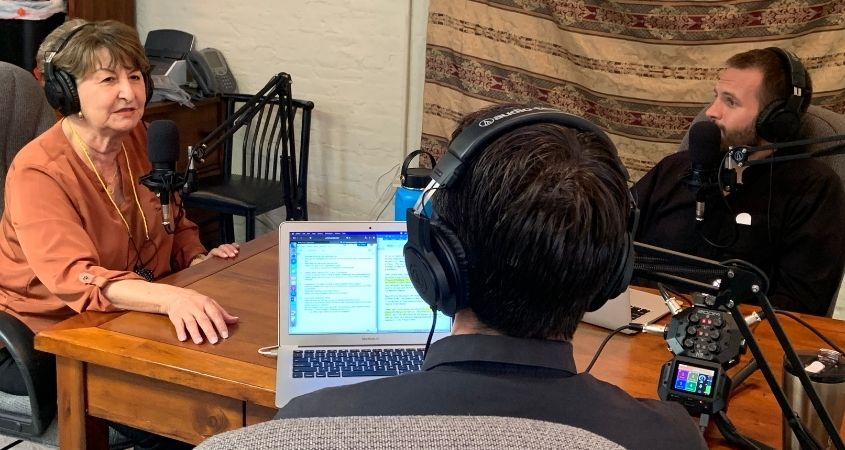
Frs. Brian and Louie interview Ofelia de los Santos, director of Jail Ministry for the Diocese of Brownsville.
ISN: Talk to us about your guests—how are they helping you and listeners make connections between the reality on the U.S.-Mexico border and Catholic Social Teaching?
Fr. Brian: For the first season of The Jesuit Border Podcast, all of our guests are from the Rio Grande Valley, because that’s where we live and work. They are people who have been influential in our life down here because of the amazing work that they do. They have taught and inspired us in our ministry in so many ways!
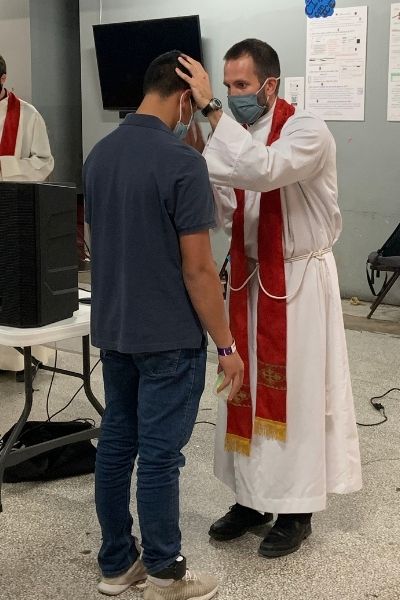
Fr. Brian Strassburger offers a blessing to an asylum seeker.
We’re new arrivals: we’ve only been down here for a few months. But our guests bring a wealth of knowledge and experience. Many of our guests are natives to the Valley, which allows them to offer insights and a sense of perspective that goes far beyond what we can offer. As a pair of Catholic priests, we always ask questions pertaining to faith, and we base every episode on themes of Catholic Social Teaching. The responses that this has brought out of our guests are incredibly enlightening, and they help to show what “principles”/themes look like in action.
ISN: How can readers take action as advocates and as people of faith in support of your work?
Fr. Brian: First, I would say subscribe and follow the podcast and share it with others. We need to convert a lot of hearts, including among U.S. Catholics! Second, you can advocate for immigration reform. Reach out to organizations, like ISN, to find out what immigration issues are being discussed in Congress and call your representatives to talk about how these issues matter to you. Third, financial contributions to organizations working on the border, like the ones we highlight in the podcast, can help advance their work. For our part, we have an Amazon wishlist of items that we bring to migrants in the plaza in Reynosa. People can also sign up for our newsletter to get the latest update on our ministry and the podcast. Fourth, come and see! Organize a trip (with friends, family, a local parish or school) to spend time at the border. Meeting migrants and seeing the reality is what hits closest to home. It will change you! Last but not least, pray. It’s one of the first things that migrants ask for. So pray for migrants and their families, pray for comprehensive immigration reform, and pray for the people working on the border.
You can find the Jesuit Border Podcast wherever you get your podcasts, plus you can subscribe to the podcast newsletter here!

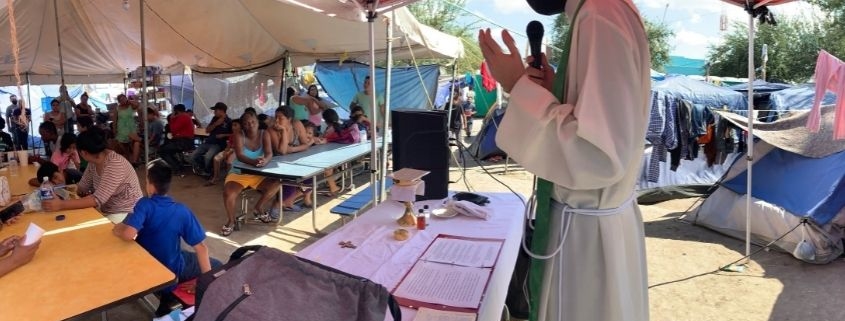
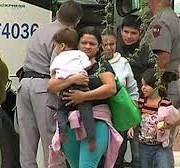
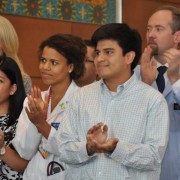

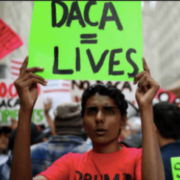
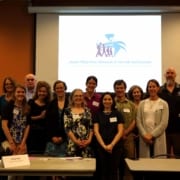
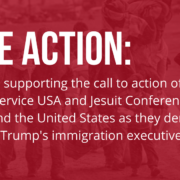

It’s a heroic engagement and a challenging apostolate. Brian and Louie will inspire countless others to aim for MAGIS. God bless.